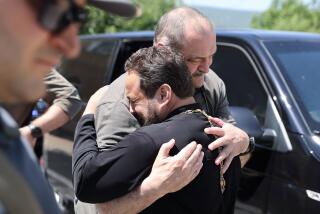Russian president blames violence in Ingushetia on domestic problems
- Share via
MOSCOW — Russia’s president acknowledged Wednesday that growing violence in the impoverished southern republic of Ingushetia is rooted in unresolved domestic problems such as corruption and poverty.
The statement was an admission of the deep and ominous troubles tearing at the Caucasus, and a departure for an administration that has generally preferred to downplay the violence in its restive southern republics or, when pressed, to blame foreign meddling for the bloodshed.
“You talked about the influence of a number of factors, including international ones such as funding of terrorists, religious extremism. These external factors do exist,” President Dmitry Medvedev said during a meeting with security officials. “But the main cause is inside the country, however sad it sounds.”
Socioeconomic problems are driving the violence, Medvedev said, according to Interfax news service, including “unemployment, clans who could not care less about people . . . as well as corruption, which has really become very widespread among law enforcement authorities.”
Months of brazen daylight attacks on government facilities and midnight disappearances at the hands of security officers came to a dramatic peak Monday, when a suicide bomber rammed a truck packed with explosives into the police headquarters in Ingushetia’s main city, killing 25 people and injuring more than 100.
Medvedev has responded with evident anger. He immediately fired Ingushetia’s interior minister and has denounced the failure to stop the attack. On Monday, he said that failure to protect police officers will result in dismissal at all levels.
“Most of what we have is not working, and that was proved by the criminal act,” he said. “This is unforgivable. This is simply a crime.”
Smaller attacks are a routine reality in Ingushetia; on Wednesday, a federal intelligence agent was shot to death. But the scale of Monday’s attack has forced the government in Moscow to reassure the public that it will restore peace in the troubled republics of Ingushetia, Dagestan and Chechnya.
Still scarred by two bloody Chechen wars, the Russian government has sought to downplay violence in the Caucasus. In April, Moscow declared that its counter-terrorism operation in Chechnya was done, signaling a symbolic end to the pacification of the republic.
But the killing has continued, especially in the neighboring republics of Ingushetia and Dagestan.
Meanwhile, human rights workers have warned that the merciless crackdown on civilians in Chechnya opens the risk of quietly breeding a new generation of rebels.
Chechen President Ramzan Kadyrov has been roundly criticized by human rights groups for his brutal style of rule, but Moscow has continued to lavish money, praise and unstinting loyalty on the former rebel’s administration -- precisely because Kadyrov was credited with keeping Chechnya quiet.
This summer, in a sign of growing desperation after the Ingush president was gravely wounded in a suicide bombing, the Kremlin asked Kadyrov to intensify operations in neighboring Ingushetia.
“The crimes that have been committed lately against the Ingush leadership, individual law enforcement officials, regular citizens and human rights activists must entail severe and unavoidable punishment,” Medvedev said Wednesday. “Terrorists must be fought unceremoniously and must be eliminated without any emotions or hesitation.”
--
More to Read
Sign up for Essential California
The most important California stories and recommendations in your inbox every morning.
You may occasionally receive promotional content from the Los Angeles Times.










